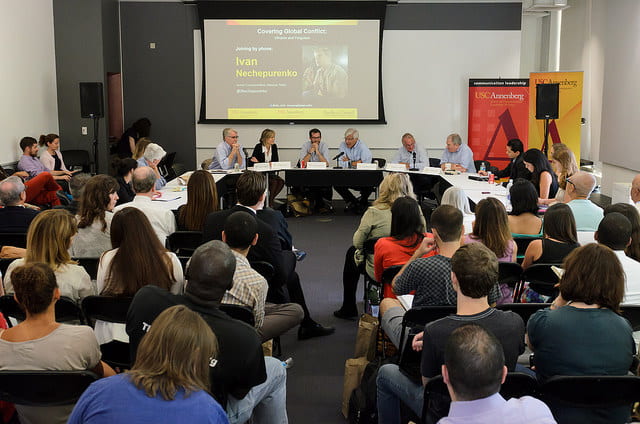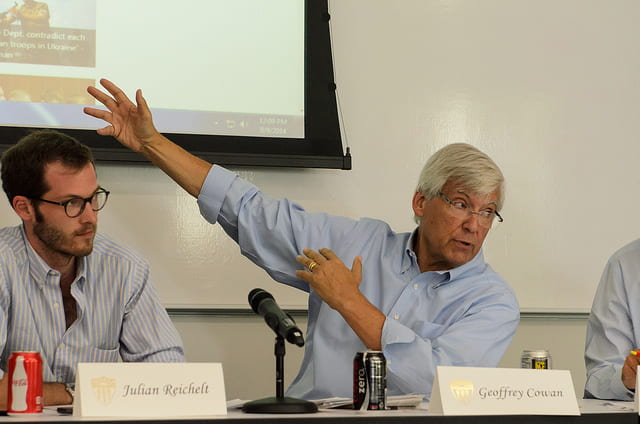Journalists from Germany and Russia joined USC Annenberg students, faculty and special guests to share their first hand accounts of the physical dangers and moral dilemmas of reporting on international conflicts like the war in Ukraine at Covering Global Conflict, the first in a series organized by USC Annenberg’s Center on Communication Leadership & Policy (CCLP) and School of Journalism, along with the Pacific Council on International Policy (PCIP).
More than 100 students, journalists, and Pacific Council members attended the forum, which was among the first special events held in USC’s new Wallis Annenberg Hall. The conversation was moderated by CCLP director Geoffrey Cowan and introduced by Willow Bay, director of USC Annenberg’s School of Journalism.
“Journalists have become a target–not only one of several targets in the warzone, but almost one of their favorite targets,” said Julian Reichelt, editor-in-chief of the popular German news site BILD.de and a war reporter who has covered Iraq, Syria, Afghanistan, and Lebanon.
“Silencing them is the first step, but as we saw in the case of James Foley and Steven Sotloff, they can also use them for political leverage. […] The best protection, I think, against propaganda […] is to always have our own people on the ground.”
CCLP visiting fellow Florian von Heintze, deputy editor-in-chief of BILD, Europe’s bestselling newspaper, agreed: “Whether it is […] a local farmer or President Obama, […] the best access to a story, we found, is personal.”
But sometimes, as in Syria, the risks of reporting on the ground become too great to justify endangering journalists’ lives. ABC7 reporter and USC Annenberg alum Elex Michaelson asked if it was possible to better educate reporters in conflict zones such as Syria.
Reichelt said that he would no longer send his reporters to Syria, so improving coverage of that particular conflict would be difficult.
“Not much education is possible anymore,” Reichelt said. “We have missed that point and we are to blame.”
https://twitter.com/ABC7Elex/status/509429805310570496
The forum also explored the complicated role of news as both a public service and a commodity. Joining by phone, Moscow Times correspondent Ivan Nechepurenko said that state-sponsored media paint a biased, singular picture of their conflicts in both Russia and in western countries.
“We have to look at both sides and see what their interests are. Media in Russia and the U.S. often try to exploit the situation to bring more readers,” Nechepurenko said. “I think the goal should not be to find who to blame, but to supply the best and quickest way to prevent further human suffering. And I think the media can be very instrumental in this.”
CCLP director Geoffrey Cowan discusses the Russian media with Julian Reichelt, editor-in-chief of BILD.de. See all event photos on Flicker.
Professor Robert English, an expert on the politics of Russia and director of USC’s School of International Relations, cited the example of a speech given by President Obama, in which he compared the annexation of Crimea to Kosovo’s secession from Serbia in 2008. According to English, foreign media outlets such as The Guardian published stories about the president’s factual errors, but American journalists devoted few column inches to the issue.
“This is a good example, and I can cite many, of […] the absolutely different perspectives [of the media],” English said. “Beyond the simple facts, I’m more interested in which stories […] are deemed important.”
“Robert’s point is a good one,” said former USC Annenberg Journalism School director and Pulitzer Prize-winning editor and correspondent Michael Parks. “There are different narratives in almost every conflict. […] Whose narrative is right? Is it the responsibility of the journalist to decide or to explain?”
Saving Park’s open-ended question to serve as a springboard for future conversations in the Covering Global Conflict series, Cowan wrapped up the discussion by asking the panel how online and social media have affected the coverage of global conflicts.
“In online media, we need to stay true to our core identity, but now we have to do this in a faster environment,” Reichelt said. “We have to try to be faster but if we move away from being right, we will sabotage ourselves.”
Covering Global Conflict is co-chaired by Geoffrey Cowan, CCLP director and USC University Professor, Willow Bay, director of USC Annenberg’s School of Journalism, Jerrold Green, PCIP president & CEO, and Mickey Kantor, CCLP and PCIP board co-chairman.

